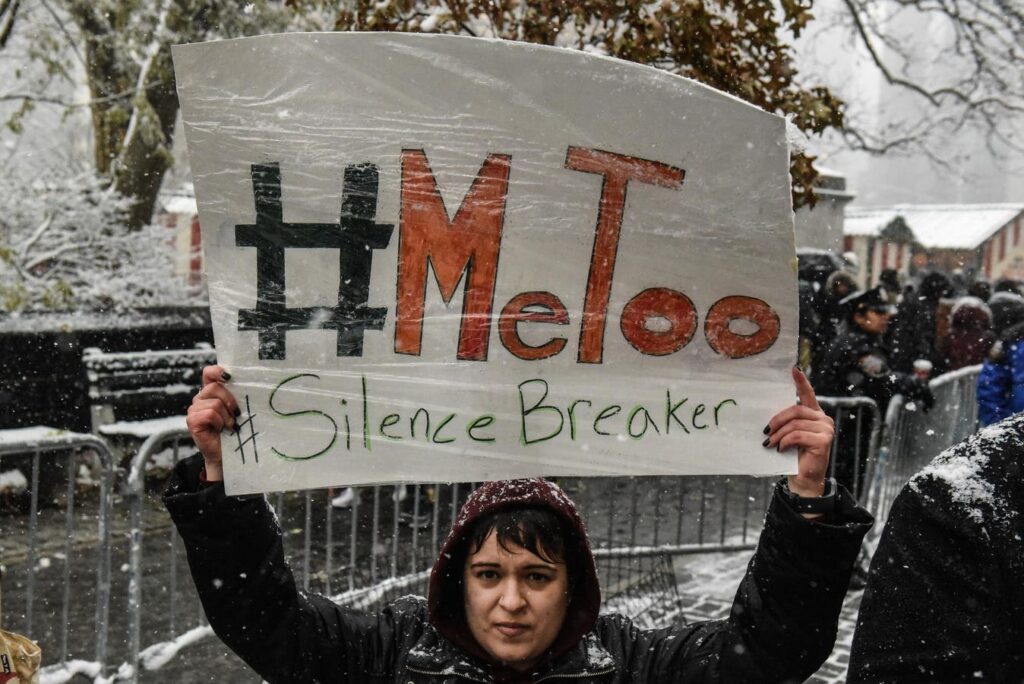In a news story about Harvey Weinstein’s trial for sexual assault, New York Times reporter Hurubie Meko noted the difference between the movie mogul’s first trial in 2020 and the ongoing one in the same courthouse. The 2020 courtroom was “overflowing with reporters prepared to broadcast every moment of his trial to an avid audience.” Now, she wrote, “[n]o cameras wait to catch a glimpse of his arrival. A cordoned-off press area in front of the courthouse sits empty.” Does the lack of attention represent backsliding or gender regression in terms of public concern about sexual harassment or assault, as some have suggested? Is #MeToo finished? What do the polls say?
I’m not aware of any new public polling on the movement that came to prominence in 2017, but there are many polls from recent years that can point us to some answers. The allegations in late 2017 of harassment and assault across many industries were a public wake-up call with a high level of pollster attention. A 2017 Economist/YouGov poll found that 86% of women and 75% of men believed sexual harassment was a very or somewhat serious problem. In an Ipsos/NPR poll from 2017, 59% of women said they had experienced harassment. A 2017 Pew Research Center poll found that 66% believed harassment and assault were indications of widespread problems in society; only 28% said they were isolated incidents.
In the polls, men and women agreed about what constituted harassment. More than nine in ten men and women said that a man taking a photo up a woman’s skirt was always or usually harassment, and separately, a man exposing himself, or a man asking for sexual favors, were considered harassment. Fewer than 10% of either sex said a man asking a women out for a drink was.
When asked over time about workplace harassment, 55% of women in 1998 told Gallup it was a major problem. That rose to 73% in 2017 but receded slightly, to 70% in 2019. In each case, men were less likely to describe it as a major problem, with more men than women saying it was a minor problem. Hardly anyone of either sex volunteered that it wasn’t a problem.
An Economist/YouGov poll in 2019 asked how serious the problem was in different industries. “Hollywood” was the top response, at 75%. Far fewer, a third, reported it was ever a serious problem in their own workplaces.
Given the findings above, concerns about backsliding seem unwarranted. It is hard for any movement to sustain the kind of energy #MeToo had in 2017. Americans simply move on to other important day-to-day concerns. Another reason, perhaps, for less attention is that most women do not experience harassment often. Regular YouGov tracking since 2020 shows that around 75% of women say they have not experienced sexual harassment in the past month. Around 8% have.
Many Americans also believe the movement brought positive change. Seventy percent told Pew in a 2022 poll about #MeToo that compared to five years prior, it was more likely that people who commit harassment and assault would be held responsible. Only 7% said it was less likely. Additionally, most Americans probably made up their minds about Harvey Weinstein long ago, and revisiting his crimes is unlikely to be of as much interest. The music mogul Sean “Diddy” Combs trial for sex trafficking and racketeering in another NYC courtroom is getting considerable attention. Polls from 2024 show that Americans who have an opinion about him have a very negative one.
Also dampening intensity for #MeToo is the fact that in some high profile cases the facts were murky. That is probably why Dr. Christine Blasey Ford’s claims in 2018 about a 1980 high school assault by Supreme Court nominee Brett Kavanaugh did not derail his nomination. How could we really know what, if anything, happened?
Women also know that they have made enormous strides in the workplace and elsewhere where discrimination was rife in the past and harassment more common. After a dip in 2018, which may have been related to #MeToo or Donald Trump’s election or something else, a small majority of women have told Gallup they are satisfied with women’s position in society.
But there is still work to be done. Reading even a few paragraphs about the testimony at these two NYC trials isn’t for the fainthearted, and men and women recognize that there are some very bad actors who must be held accountable for their actions. #MeToo brought attention to the problem and for most people now it is being addressed, albeit imperfectly.
Read the full article here


